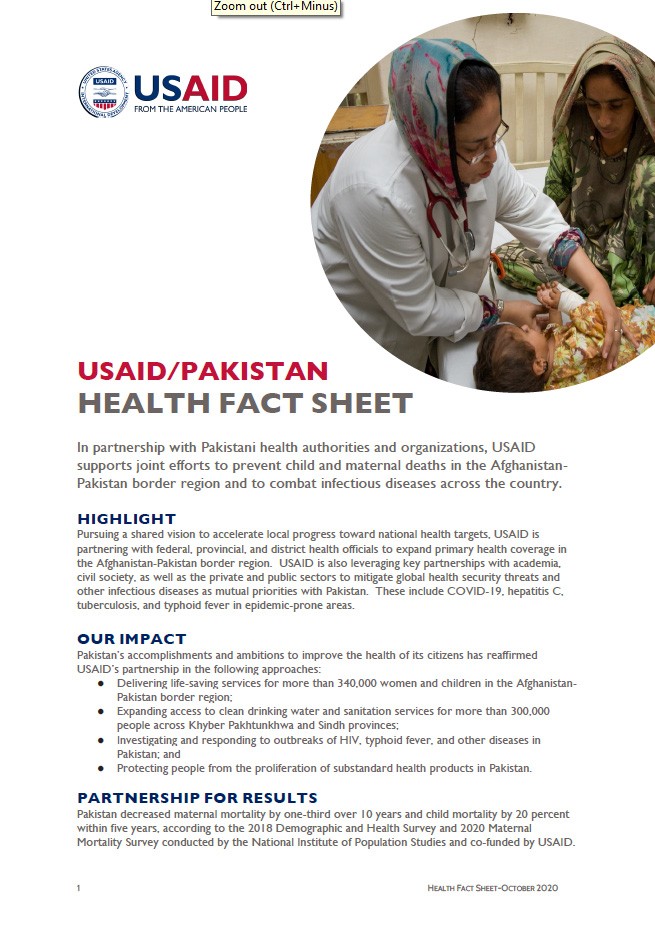Speeches Shim
In partnership with Pakistani health authorities and organizations, the United States Agency for International Development (USAID) supports joint efforts to prevent child and maternal deaths in the Afghanistan-Pakistan border region and to combat infectious diseases across the country.
HIGHLIGHT
Pursuing a shared vision to accelerate progress toward national health targets, USAID partners with federal, provincial, and district health officials to expand primary health coverage in the AfghanistanPakistan border region. USAID is also leveraging key partnerships with academia, civil society, and the private and public sectors to mitigate global health security threats and other infectious diseases. These include COVID-19, hepatitis C, tuberculosis, and typhoid fever in epidemic-prone areas.
OUR IMPACT
- Pakistan’s accomplishments and ambitions to improve the health of its citizens has reaffirmed USAID’s partnership in the following approaches:
- Delivering life-saving services for more than 340,000 women and children in the Afghanistan-Pakistan border region; ● Expanding access to clean drinking water and sanitation services for more than 300,000 people across Khyber Pakhtunkhwa and Sindh provinces;
- Investigating and responding to outbreaks of HIV, typhoid fever, and other diseases in Pakistan; and
- Protecting people from the proliferation of substandard health products in Pakistan.
PARTNERSHIP FOR RESULTS
Pakistan decreased maternal mortality by one-third over 10 years and child mortality by 20 percent within five years, according to the 2018 Demographic and Health Survey and 2020 Maternal Mortality Survey conducted by the National Institute of Population Studies and co-funded by USAID.
In addition, USAID’s partnership with the Government of Pakistan has achieved significant results.
- In partnership with Pakistani health authorities, educational institutions, workers, and volunteers, USAID supported efforts to deliver health services for nearly 11 million women and children and train over 52,000 people on primary health during the past seven years.
- Collaborating with Pakistani health officials, architects, and engineers, USAID built clinics and hospitals, expanding access to health in historically underserved areas.
- In cooperation with USAID and other international partners, Pakistan controlled what was the world’s largest outbreak of extensively drug-resistant typhoid fever, which spread to the United States and other countries. In December 2019, a mass campaign with a new typhoid fever conjugate vaccine — developed through a public-private partnership that included the University of Maryland — effectively interrupted transmission. USAID and other international partners are supporting Pakistan to incorporate this vaccine as part of its routine immunization program.
COVID-19 RESPONSE
Guided by the Pakistan Preparedness and Response Plan and featured in the COVID-19 Partners Platform, USAID is partnering with the National Disaster Management Authority and Ministry of National Health Services, Regulations, and Coordination to mitigate the COVID-19 epidemic by taking the following actions.
- In collaboration with federal, provincial, and local health authorities, USAID is strengthening COVID-19 monitoring and rapid response units in all districts across Pakistan.
- Leveraging the expertise of Pakistani developers, USAID is introducing digital solutions to expedite COVID-19 case identification, investigation, and reporting and manage commodity procurement and distribution.
- As a partner with the National Disaster Management Authority and provincial officials, USAID provided 200 ventilators and trained over 400 health workers in 64 hospitals in 46 cities across Pakistan, expanding the country’s critical care capacity by 30 percent.
- Supporting Pakistan as a source of COVID-19 therapeutics, USAID is engaging Pakistan-based Ferozsons Laboratories to produce, market, and distribute remdesivir, with a licensing agreement from U.S.-based Gilead Sciences.
News
Current Projects
Check this space for information on current Health projects

Health Sector Fact Sheet [PDF, 634K]


Comment
Make a general inquiry or suggest an improvement.